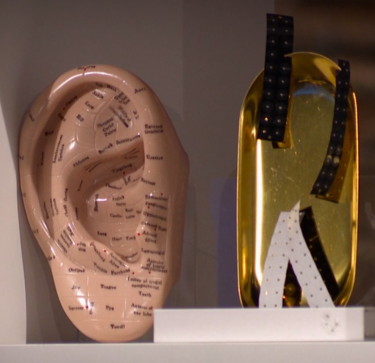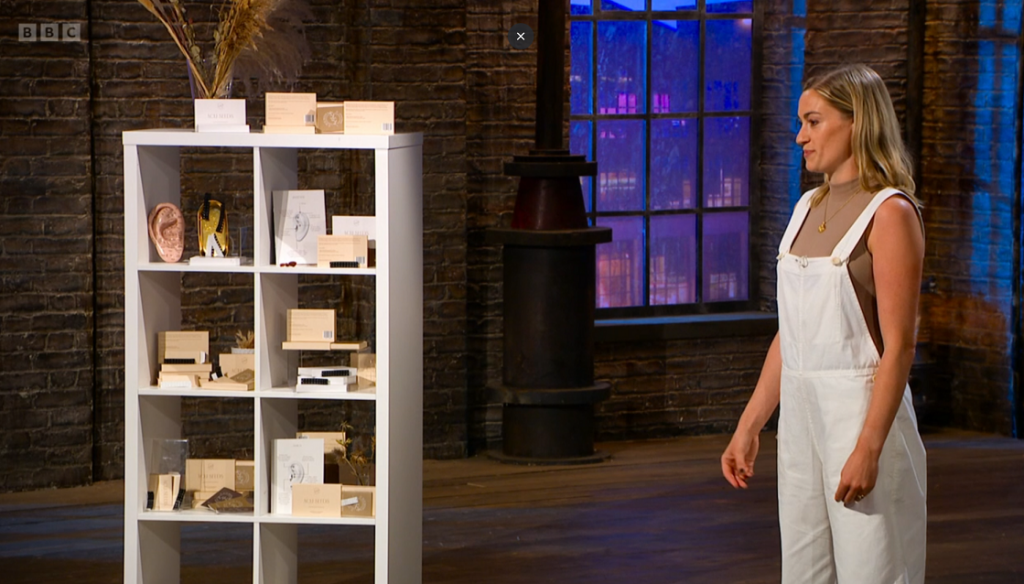When your illness is untreatable and incurable, peddlers of dubious treatments circle like you’re a warm, twitching cow carcass. There are broadly two kinds – those who know they are misleading you, and true believers. The recent and still unfolding Dragons’ Den scandal seems to be a potent combination of both. Contestant Gisele Booker, founder of Acu Seeds, Chronic Fatigue Syndrome (ME/cfs) sufferer, and recipient of six offers – this season’s first full house – has all the hallmarks of the latter. The BBC and the Dragons’ Den production team do not get the same benefit of the doubt.
In her white overalls and matching Birkenstocks, it’s clear that we are being shown that she is no cow carcass – she’s a phoenix. She opens her pitch with an inspiring story of resurrection, how she went from a devastating diagnosis, unable to leave her bed, unable to work, told she would never conceive a child – to the successful entrepreneur and mother standing before us. She credits her recovery to the wares she is now flogging – a set of twenty ball bearings affixed to a small sticker, designed to be stuck to the conch of the ear, described on her website as ‘auricular acupuncture’.
The reason I am willing to give her conditional benefit of the doubt is that we share more than a natty dress sense – we have both had our lives reduced to ash by ME/cfs. I know how desperate it makes you. When I got sick I was determined not to get dragged into any nonsense – only to find to my horror that the best that medical science had to offer me was little better than ‘have you tried doing yoga and thinking happy thoughts about it’. The story of how a handful of influential researchers were able to push psychological treatments for a serious neurological condition for decades – essentially suffocating legitimate biomedical research – is a fascinating indictment of how junk science can masquerade as legit science, but sadly one too intricate and lengthy to be told here.
Suffice to say that I’ve been sick the better part of a decade, and the sum total of medical care I have received for the condition that took me from ex dancer, obsessed gym bunny, training for a half marathon, about to start my master’s degree, to housebound, unemployed, and needing a wheelchair to be out of the house for more than half an hour, is pitiful. Some painkillers for the nerve pain and migraines, high dose vitamin D to compensate for living my life as a mole person, and some sleeping pills to try and rein in the 40+ hour jags of insomnia (didn’t work).
I’m lucky – my level of impairment is considered ‘moderate’. At my worst I could usually still walk if I needed to, it would just be days and days of excruciating pain and not being able to sleep, and cognitive impairment so bad that I felt as if I was getting dementia. I was unable to remember names, important details about my loved ones, and I got locked out of my bank account because I couldn’t work out which letter of my password they wanted. I get restless limbs so severe I occasionally resorted to hurting another part of my body on purpose in the hope that acute pain would help stop the feeling of needing to claw my skin off. This is getting off easy.
Around 25% of ME/cfs sufferers – tens of thousands of people – spend decades trapped in dark rooms, unable to even roll over or eat independently. ME/cfs is not necessarily a terminal illness, but people do die of it – often when they reach a stage of fatigue so extreme their body can no longer digest food properly and they die of starvation, because there’s no standard protocol for tube feeding people with the condition, and doctors are either not comfortable attempting it or are still so convinced that it is a purely psychological condition that they refuse to treat.
Almost everyone with severe ME started with mild or moderate symptoms and became sicker either because of over exertion – often because they didn’t have the means to stop working when they needed to, or were forced into exercise therapy – or because of an unknown factor that biomedical research has yet to uncover. Every person with this diagnosis lives in soul-crushing fear that we could end up in the severe group.
That is what is on the line when people push quack cures and supposedly grown-up institutions like the BBC platform them. As a group, people with ME/cfs are no more inclined towards alternative medicine than the general population – however the desperate void left by a lack of proper research, medical neglect and sometimes cruelty, the fear that we could lose what little we have, and the grimness of our day-to-day living, does leave us extremely vulnerable to trying anything that gives even the tiniest glimmer of hope or illusion of control.
I believe that Gisele is acting in good faith – she either won the spontaneous recovery crapshoot (the chances of which are around 5-10%), or she’s currently riding the remission rollercoaster, and heartbreakingly could be in for a rude awakening. Having ridden it a few times myself, I almost envy her faith that she’s found the answer, that even if she feels the sapping, ghostly fingers of fatigue gripping her again, she knows how to fend them off – all it takes is some herbs and some handy dandy ear stickers (in your choice of silver or gold).
The stickers in question are an alternative therapy better known as ‘ear seeds’, and given that you can buy a functionally identical product for pennies per unit on Amazon, and that multiple other luxury brands selling the more attractive choice of silver or gold already exist, it’s not immediately obvious why the Dragons (plus bonus wyrm Gary Neville) were so excited to invest. In the outrage following her episode, it has emerged that she likely didn’t wander in off the street – she was specifically invited to pitch. There should have been no way the production team were unaware that this was not an original product or business model, or that there is precisely zero evidence that ear acupressure is effective.

This is evident in the clever little bait-and-switch performed in the edit that allows the show to leave audiences with the very explicit impression that this product is essentially a cure for a serious, incurable neurological condition, while at the same time never actually saying anything of the sort. Watched with a critical eye, there is very obvious care taken to avoid any explicit medical claims, indicating that at least one person knows the precise thickness of the ice on which they were skating.
The strongest indication of funny business is the complete lack of curiosity from the ‘Dragons’ (and Gary) about how the product works. The only evidence apparently necessary to induce a titan of industry to drop £50k on a ‘wellness’ brand is a practical demonstration comprising an apparently healthy Deborah Meaden having her shell-like swabbed with an alcohol wipe and a couple of stickers applied – despite this only being proof that the stickers are, in fact, sticky.
Despite the set being dressed with a large ceramic ear with delineated regions that are clearly relevant to the proposed functionality of the product, the usual consultation – where the practitioner engages in the theatre of matching diffuse symptoms to an apparently specific herb, colour or bodily region – was conspicuously absent. We can only speculate as to why – perhaps because Gisele was briefed by production or her own legal advisor to skip it, or because it was carefully excised in the edit.

Without the outrage and campaigning from the affected community, that likely would have been enough. The programme very likely knew it was selling bullshit, and the Dragons must have had at least an inkling, but they danced right up to the edge of legality and decided to go ahead anyway – and who can blame them? Despite being unoriginal and operating in a fairly saturated market, Gisele’s elevated side hustle is pretty tasty. If I was a Dragon I’d look at the succulent lamb being offered at the mouth of my cave (sorry, Den) and be salivating at those tasty, fatty margins.
Gisele explained in her pitch that she buys the stickers for £3 and sells them for £30, making £27 profit on each sale. She cleared somewhere in the region of £60k profit in her first year of operation, easily recouping her initial £5k investment. The value in her business isn’t the £3’s worth of stickers, it’s Gisele herself – and it clearly worked. Despite the episode being pulled and re-edited (with the addition of an equivocal on-screen disclaimer to give the patina of responsibility), it clearly achieved the desired effect: a message on her website explains she is sold out, and warns customers of likely shipping delays.

False hope in the face of false choice
Recovery stories are a common comorbidity of any intractable illness. As soon as you get sick, it turns out everyone has an auntie or friend of a friend who had your illness and got better by rubbing something, eating something else, or paying a lot of money to have someone poke something into your somewhere. At their mildest they are an irritant that you learn to nod, smile and graciously murmur your way through; at worst they feel selfish and cruel. Very few of the people recommending some foul tea actually care if you get better or not, they just find being faced with the reality of mortality and suffering uncomfortable, and want to regain a sense of control by imagining that the sufferer is a wet-eyed naif, incapable, unwilling or unable to take control of their situation or to explore all available options.
When the call is coming from inside the patient community, the effect is magnified. There’s a real hope in seeing other people recover, but that hope is almost never the light at the end of the tunnel, it’s just marsh gas. You chase the light of a specific supplement regime, meditation, low dose aspirin, oxygen therapy, ozone therapy… only to have it flit out of sight, or dissolve as soon as you reach it.
Chronic Fatigue Syndrome (ME/cfs) has been the black sheep of biomedical research funding for decades. There is still no definitive diagnostic test or proper taxonomy of the large constellation of similar illnesses that can fall under the ME/cfs umbrella. The year I got sick with the illness that has systematically devastated my life, it received less research funding than male pattern baldness (no shade to the prematurely defoliated, I’m sure the struggle is real).
The choice for sufferers isn’t between proven, evidence-based medicine and alternative medicine, it’s between alternative medicine and nothing. As much as it feels like a betrayal for someone to win the crapshoot of recovery or extended remission and immediately turn around and try and profit off the people they left behind, it’s hard to fully blame them. I understand wanting to feel like you have the answer, like you have power over an illness that in your heart of hearts you know could creep back in at any time and destroy your life all over again.
The thing that makes someone like Gisele so tasty to people (and broadcasters) who should know better is that she allows them to bridge the legal gap between wanting to sell very expensive nothing to people who have nothing, and being unable to make any claims about its efficacy without getting sued. Gisele’s story IS the product.
A very reasonable question you’d expect from a potential investor is who the customer base is. Who is this product for? What is the addressable market? Acu Seeds is already pretty successful – has it peaked? The fact that not a single Dragon or Gary asked this is a further implication that on some level the show knows that the customer base is Gisele’s ‘before’ picture. It’s me, it’s the hundreds of thousands of ME/cfs sufferers in the UK that are being constantly topped-up by a tributary of Long Covid sufferers who go on to fit the diagnostic criteria for ME/cfs. If Gisele is just sharing her personal experience, nobody is breaking the law.
The harm being done by platforming businesses like Acu Seeds goes beyond parting desperate people from thirty quid they probably don’t have. The exploitation in this case is contemptible, but the bigger harm is epistemic. We are at an incredibly important juncture. ME/cfs and Long Covid are similar enough in their aetiology that, recently, research has actually accelerated. More has happened in the last two years that I have been sick than in the six that proceeded them. Maintaining this momentum is vital and public interest and pressure is a huge part of that.
ME/cfs is under-researched because of the persistent implication that it is a yuppie flu – a malady of the louche, feckless and privileged, or the feeble, scrounging and hysterical. The more that trusted institutions like the BBC promote the idea that it can be treated with something as trivial as ear stickers, the more it perpetrates an ouroboros of public perception – if the cure is trifling, the illness must be trifling too, and anyone still suffering should simply be more like Gisele.



